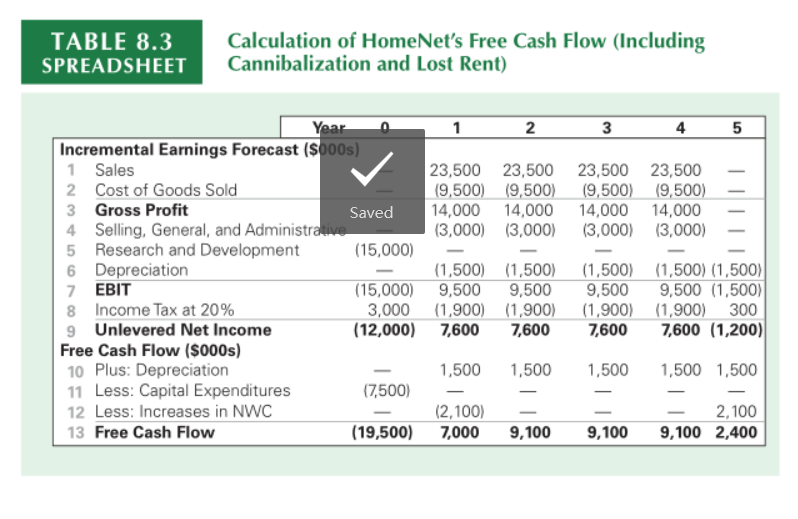Question
After looking at the projections of the HomeNet project, you decide that they are not realistic. It is unlikely that sales will be constant over
After looking at the projections of the HomeNet project, you decide that they are not realistic. It is unlikely that sales will be constant over the four-year life of the project. Furthermore, other companies are likely to offer competing products, so the assumption that the sales price will remain constant is also likely to be optimistic. Finally, as production ramps up, you anticipate lower per unit production costs resulting from economies of scale. Therefore, you decide to redo the projections under the following assumptions:
- Sales of 50,000 units in year 1 increasing by 50,000 units per year over the life of the project, a year 1 sales price of $260/unit, decreasing by 10% annually and a year 1 cost of $120/unit decreasing by 20% annually.
- In addition, new tax laws allow 100% bonus depreciation (all the depreciation expense occurs when the asset is put into use, in this case in Year 0).
- Each year 20% of sales comes from customers who would have purchased an existing Cisco router for $100/unit and that this router costs $60/unit to manufacture. The existing router's price will decrease by 10% annually and its cost will decrease by 20% annually as well.
- The used equipment that Cisco purchased for $7.5 in Year 0 is sold in Year 5 for a salvage value of $0.5 million.
- Other assumptions remain the same, including lost rental and 4% inflation in SG&A expenses.

please Calculate HomeNet's net working capital requirements under the new assumptions.
TABLE 8.3 SPREADSHEET Calculation of HomeNet's Free Cash Flow (Including Cannibalization and Lost Rent) Year 1 2 3 4 5 Incremental Earnings Forecast (5000s) 1 Sales 23,500 23,500 23,500 23,500 2 Cost of Goods Sold 19,500) (9,500) (9,500) (9,500) 3 Gross Profit Saved 14,000 14,000 14,000 14,000 4 Selling, General, and Administrative (3,000) (3,000) (3,000) (3,000) 5 Research and Development (15,000) 6 Depreciation (1,500) (1,500) (1,500) (1,500) (1,500) 7 EBIT (15,000) 9,500 9,500 9,500 9,500 (1,500) 8 Income Tax at 20% 3,000 (1,900) (1,900) (1,900) (1,900) 300 9 Unlevered Net Income (12,000) 7,600 7,600 7,600 7,600 (1,200) Free Cash Flow ($000s) 10 Plus: Depreciation 1,500 1,500 1,500 1,500 1,500 11 Less: Capital Expenditures (7,500) 12 Less: Increases in NWC (2,100) 2,100 13 Free Cash Flow (19,500) 7,000 9,100 9,100 9,100 2,400 TABLE 8.3 SPREADSHEET Calculation of HomeNet's Free Cash Flow (Including Cannibalization and Lost Rent) Year 1 2 3 4 5 Incremental Earnings Forecast (5000s) 1 Sales 23,500 23,500 23,500 23,500 2 Cost of Goods Sold 19,500) (9,500) (9,500) (9,500) 3 Gross Profit Saved 14,000 14,000 14,000 14,000 4 Selling, General, and Administrative (3,000) (3,000) (3,000) (3,000) 5 Research and Development (15,000) 6 Depreciation (1,500) (1,500) (1,500) (1,500) (1,500) 7 EBIT (15,000) 9,500 9,500 9,500 9,500 (1,500) 8 Income Tax at 20% 3,000 (1,900) (1,900) (1,900) (1,900) 300 9 Unlevered Net Income (12,000) 7,600 7,600 7,600 7,600 (1,200) Free Cash Flow ($000s) 10 Plus: Depreciation 1,500 1,500 1,500 1,500 1,500 11 Less: Capital Expenditures (7,500) 12 Less: Increases in NWC (2,100) 2,100 13 Free Cash Flow (19,500) 7,000 9,100 9,100 9,100 2,400Step by Step Solution
There are 3 Steps involved in it
Step: 1

Get Instant Access to Expert-Tailored Solutions
See step-by-step solutions with expert insights and AI powered tools for academic success
Step: 2

Step: 3

Ace Your Homework with AI
Get the answers you need in no time with our AI-driven, step-by-step assistance
Get Started


